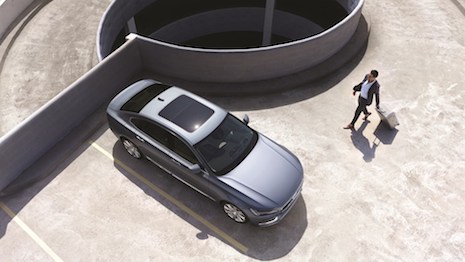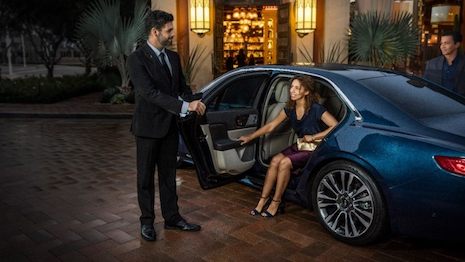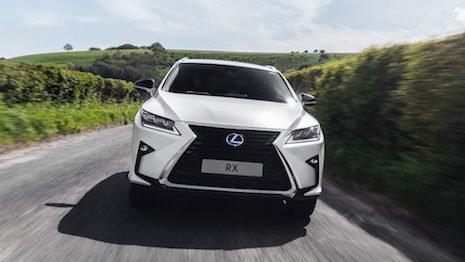Improved driving and safety performance and customer service have increased customer satisfaction among luxury car owners, but potential tariffs are threatening to negatively impact the trend.
According to the 2018 Automobile Report by the American Customer Satisfaction Index, customer satisfaction with cars is up 1.2 percent to a score of 82 on ACSI's 100-point scale. However, the rise in satisfaction is attributed to improved car value, which may decline if proposed tariffs lead to higher prices for both imported and U.S.-made vehicles.
"The proposed tariffs, which are expected to kick in soon, could alter the entire automotive landscape," said David VanAmburg, managing director at the ACSI. "U.S. cars, whether they are made at home or abroad, could see average sticker prices rise as a result of tariffs on imported autos and auto parts."
The report was based on 4,649 customer surveys collected between Aug. 11, 2017 and July 31, 2018.
Driver satisfaction
Eighty-six percent of the highly-rated marques are imports. European-made cars have an average customer satisfaction score of 82, while Japanese and Korean automakers average 81 points.
Toyota Corp.'s Lexus and Swedish automaker Volvo topped the luxury auto segment with driver satisfaction ratings of 85. While the Lexus score dipped one point from 2017, Volvo improved by 4 points.

Volvo's customer satisfaction scores improved by four points. Image credit: Volvo
"In line with its improved customer satisfaction, Volvo is expected to have record sales this year," Mr. VanAmburg said. "Other manufacturers will now pay more attention to the brand to see what they’re doing right and what enhancements have been making the biggest impact on consumers.
"We expect other automakers to emulate Volvo’s recent changes, particularly in the areas of vehicle safety and comfort, as best they can in hopes that it will help improve their customer satisfaction," he said.
Lincoln was the top rated U.S.-made luxury car by improving one point for a score of 83, while Cadillac dropped one point to a score of 82. With a rating of 83, Audi narrowly outperformed fellow German automakers Mercedes-Benz and BMW which both scored 82.

Lincoln was the highest-rated U.S. luxury automaker for customer satisfaction. Image courtesy of Lincoln
Luxury vehicles saw improvement in nearly every category of customer experience from 2017 to 2018.
Driving performance, dependability, interior, exterior and safety all improved to 87 points. Comfort (86), technology (84) and Web site satisfaction (84) stayed steady year-over-year.
Automakers are wise to continue investing in electric and hybrid vehicles, as there is room for improvement in terms of gas mileage. Customers would also like to see better warranties from luxury brands.
Tariff impact
Despite clear improvements in vehicle and service quality, the growth in customer satisfaction is primarily due to car value. As car prices are expected to rise, this level of satisfaction will be difficult to maintain.
The tariffs President Donald Trump proposed could reach up to 25 percent, placing a significant toll on foreign exporters and the customers in the U.S. who desire foreign cars.
While likely aimed at protecting American interests from cheaper cars manufactured in Asia, tariffs on imported cars would also have an effect on luxury vehicles, many of which are manufactured in Europe. Many American-made vehicles include foreign parts, so tariffs would still cause production costs to rise stateside (see story).
Automakers also need to prepare for the impact that possible tariffs may have on sales in the U.S., as a recent study found prospective buyers could consider opting for used cars.
According to a survey from Autolist, 65 percent of consumers expect car prices to climb if auto tariffs come to fruition. Forty-one percent of car shoppers would choose to purchase a pre-owned vehicle if tariffs increased car costs.
Based on reports, if automakers choose to pass on increased costs to consumers, prices could rise by up to 20 percent — a difference of thousands of dollars (see story).
"It’s no surprise the tariffs will mean increased costs for cars imported from Europe or Asia," Mr. VanAmburg said. "However, what many people don’t realize is, due to the proposed tariffs on steel and aluminum, the cost for auto parts will go up and American-made cars will also see increased prices."
{"ct":"yAbBHZ1G6J8lMYIlnTgivkZ9Aky2L4U3y9lGI2ivJKkMYLoCxWTYtwvdrBRP+p4gSJdQSaOOFDPSDzrkcoFz7Sn9I\/5kPXu0iAXeHspPiMnah0TR4h8HtLZnPOF+IQ\/Sg1lvagojhfFQ6ZCSb+hEyhjws9vqw+x8zmBJXVGIJR2SiRimVxr+5TCtz8jYLLNmpdT443Zciu0qGzyR0jy9g8hXm8+c6E8SXZPkDkaXMBRhlZyUeJG0xD1\/DRK01ScTuvfSXuxcfaNHDLqv77WxHUzaBrVdz4i+Qw51jJOxBX4\/yzX2Lb0VpeNIcS+qj\/Mx14waSFZkM\/cSPpA2GkSGPiH\/JFkqq8hH4QbaCYznFl5GTCd66JkiIs5eXZMOdXuoBD\/bcN2IVqa6bc7jIWU34jsYzu3bDJLzHYaBFaYUmPEpCbsrSRkQVCe35fIavdNbumdT\/muyZVM2QwEF4UTfHQWiCophvJigaSBiqzjoYXma9sajTW79AqhG8irtqWXwdAru\/PTHhCdrywOfsRfumKGjFsDsOQJE\/Aq9RK5pX30mXq\/AkH0Si+VMzAMhMrzMnwcrq70TEvNdRol1cXkn\/hqUm9e49\/9KfCHLaSYw5XcrAg0Mo\/f5Tj4aTPjWnJhM0f5xiEv2iXLE12XaRM\/X0eRHh6HhZCePUt1G8N0x6NH9AMfm7OL0DPgwtxSiBRpv7hhmd1hXxl6jXiRYcEsQtndUgqwkjvi7DUKHOkqdMBUwMhjAXFRKGC8qHVYlZB0uZ9lYULSjxSCwfMgaiXcwjgshODLZD24TmVg7Rvz7AsB4qUhP9QevhCmuJRm44qviEomHhmK6iDTZe8eA2YLfKoFbRByWvAwSwH7onn+FxHBWojCG3hsp3vMEE8YuxC6eoAQKP+aNSizjcVYPUaIsF87+ttNs9iOW9hbe1z6huTpIKeB90Ex5OeMriAdnq+0W197GQpDOu\/F3owWdttfADJe9e2OCeEBy7PCOFD5V\/IjUOyQlVjiBfdQvTtoLmxzEhev6uZUWy\/\/+T08CESKbjaLBv7PbRDTbyRe7hXv73lURwQimFq8edEwHAyGh26\/TI0DsMpykKTbU2P2ipbNNBDSQ9Fqb86Vs00AcC1GuBigptq2UrA9Bd\/y6PIIsWHyjfjuOZZTAEGPskq52qHhnMRAajAY4zSbOBuV\/J4wl609kyW7DiVhMEoV4idryQt7dmvrCJjIyJlAsomKFxB+mgPAFA5xT9btWN+376LhVW4Pj4YGB7JYSrVl3EzGB9oGP+uxs2bXQIWNDAuLn\/vOm1mymPIBM\/8TuOybLULM9SvO8bzyq6UpOENuyTvD25i9ejvsYHzi0XcL\/0ypJcTyXleuVoGXhKmi+19oD7HdMK\/FD\/SPXBG+9hPwUdleVMjjU7Z9PWH9aZp0eb+cMC0kCD0GCujK9y08CrqO+abdaUattTusGKH51XNb+rNZgNU2ARGNXEoEIZJWMSAwc\/04jTERCuOrO\/Uf\/8gl\/VthV1k7bX9\/CoLn0HSOplNy9Zt6Pf7Le6R\/RXPL5kt4KUkxa3U5jWA0UtXJNWG9O4XozMNepuxSCW28ilVMba2dGz3omaH8tSredjJP2dp9RL0UVVlrIFXTj7Gg8FGV36ZuRaBXzbKqOJ0Zrt+j4zeKD4afjKHjQQrYWF6fNEX6s9\/3SJp0je2ADTPg1UbqD4notlr3HDvO\/\/0PDeiUY4sKYd7WUL\/oJCw4WKBClHvm\/9LGKjLUDGtDENk8gZYRfpoq8HmJqDs6kzUG+STNX8T+99iGx9tTHhOAK0kJrME9z5+2yl4YD4YZuoHyoGgisBmD3Xv1mWGS5bZW7OKI+cpLzyAYHo7A80C786X8fOrAZHq6\/2edZ3CJXgEmoa7bSyCOcdMd\/cYsb+Wl\/TM9uyfQENfvkAimhJe76eBHN7pGfSF\/ls+x9VZvZF5vWypGKZo5WpUR4Qhm\/abm\/LSFiNNVdS0H054Afxq4SFvhF6Mp3uX43yILwnZBtLFkOzNnflMkF9IixI\/et8v2GyWl\/K15PfczUdSBchF\/TUONP43frHr0gHvKEid1Y5abcwtwvp7L5ByN4owLgEV31zhByyZlwg+FLZtAzk+xlpFuEpKEiaZlwJabxzcKy8gJEQzkT9IDlUFfTvN3Y+g7VBXk0A9bKY47u526m3Kk6\/luc\/UheS2z3QDp6X0MKa2WlGR63cSUhprvKeWbiGlD3RY\/rWBJQxnmXbT\/orW6dKzOsc9Q2VRDxKCcvgdX\/2kN2fDUV5eXhvU3XREAajCoulRcNyQROeRzgWe9vTR6h6s2LcrpWye8CbsBTcdWjdoNoNpkml2E0TFe0Itt4gCdyy2IcWf5Mrbx8EyhlrozU1bKBCTcKE5sIqVA5RJuUqqvKDSM4mbou0GrMV\/n4i0VN2kzRE6wB5V\/zDOyt+rvSlRh\/YlMguUILB3HzVOmaKuuIgeULw96rX2gZ9asHWUoKjHxlAFpUszLILzo2yEp8RMEexc7VwzXBfmUZOBt9ZRxaxbEV76sQOvek1+NrH6SUVIbz\/TOIXwDYVk6el6+QeKasiDPQRg\/2G0lmh5eVWDhCh2bSPxSoIu1zjB\/EXS+7GxodUGfcR14PYWjOwTLGhGhlvM2oRCvbBhG6iEzjQQBhfQpbTnDltHPFEFwmOFCsXsHQEvKCOzYj9quE5vrE\/ECtp3wZdAeZ+uClB09MPlV6Npzux\/PuG1X\/KHDX1hclz1Jt5e0JG7eolq7xjR6MKz+SZn1lW0yXB\/n0lOkq+NWF0aOymiGYPEvvX0Z4Ui+TJdGjBtLwkAhBQ70WsXNDZ8\/KoGzKE8A\/bsfyOO5CoAkhsggcGXNN0S0+GYZD8yjO62OvCmpmwpQpZuw+jhGW9Z9mzqelQoB1y8DC9dhc2eKc3R6T8zkJj1SumE5e8P\/6a2W7ZXonM2GlfMyUtVyVggVOgtuXuZDMTMqQYl5rBb7Mb2MZ9Nad4gV1zzV55YWR2PpczWoXonow\/H6AGedxOzGVuRawUrAuFvTMqrPZl7xtqF4De81lxyP6j6SPZ1u7lE0u7XSATmVSqmM1M7Emi1LlGTU4PbKCe2ZrxOltW28wjpVITQjEK3ClRu4jEF2UWiXWB4X+iKhcdKsdcneOu1ccS3CnLeBb\/povrdXDTqun7YLmNjXgx01Nu8OL1J0yWf1+T0fH6S5AIWW3V2m\/0uaKTs7g7UIgbjUZK\/mbyQ9nq2xex0a0SZTBH2cc0jCU3bV9OeDhHDZG8+8ZT6vZ\/JQap8Stx9u7Mu55Tj5gPOy1qN2nDYpIeXpfDwvro9wSCtfHXiZwM91p0elXWGTkDUGfwkBdGLpqcR9VtaJDuYYQglAhuJfUNDCGMn7bK8HOC4MuPJOjMSXWPUpkYEXumbT65hFpFaIbWJ+nGCSdNDLvJbuaF+r75\/R8kvMp\/kt3EMNXvODTiI4Sg\/INr+bIWabi53RbMWnB7Anw+j9eKwVU3LnTHsZvHuOvNTzYdu7ubshONbCyGYBmYjg3ps7zq5AviRbnvVYjj8cAHa5cvTxMSisbwsorLjq8UJSQo7V6+rBOp3xoui8yx+4J1NfEB5ua+7tLQjKU7YBAO6Uza\/jlrOmnTY7cd1+1lNE0P4g24wrgOaxHepbPqUvOYfE8jH5+I+inT9MDQFp1\/fJi7z0qUPrytNyohd7eH1xAnfxQchg716xohRXG+JrazzTnjPmfGsMHMTraJJq8kARXx+R5QZcBhoFPWmR5YYfNfn\/Sb6GJFrpu7n\/7Yw9e50wGn4PWJRhblQs3s9SPfKKHFmE83SrpCsJaV8MP55HhpZwtdAwZVtecGv4GoHqJNQA3GuxEpDh0e1L8zsJXQSfCsLxYK\/IMoM7MuoYvvjJBjfkpRhk75RzLznBaMsi30DQFUwSSwSFWLH3JAPJnZS93D8J18uR1oM2pY\/KzbNXkg4RmyMgUPklENT712rmCOXe0msjnTMIIPn\/wqzljtuYCVI\/ItFOrUAj8G9Fu7qOCQbtmEE0BTP3URfsODoa4mWROUKHkPxQMc3yZsSI2Bu+LwO+KcBC3SFZ8oAsxJj4aEiMYoEnWMWl7aJO+3GLXvLPyGY681KMnhO\/kNKmGMpnvdHTG35c4EZpUqxsbsRJWm38npHB\/DvMSXVYa0j8c1FIgAuQ8O9XyM0fw1ev4ZOHpQaknNlvZ1mWluc8UMYYHN2HCMmnammfFi1WBdaULf1oeFULm31r\/Tm+hEMeO3H5QRf0KG9hiK0PhrVt2n7CcuY10ls477RO78pEZ9r9pajJV1UNNjzxhsMdNfmID7HnyWjm0wlI0Irh4kxnwTwkqLsOgVBlJ0Os88rkvuNLHORE7xDXGUtffXv0gWDOMIvKz3j3SeZXEHW88i6n9WtpTtVafm2mtSg0B8OKIPDO6Ng8BNOGvy3JyMRP7hvDkT5ygXe\/Vi70XF+lAJzasNlbJZ7HeiqKVaPKUWKTcXCBXzQ5WXG8mbFijsaiUlIYTJUHwraDJ6az3\/pU0NjbevNapeDxx65CmmMyutznDEUCzEgy8WryBs1X7aNRt26TMJnz2aFX7mEoa+lccSPPU0VApY8GqgU\/DB\/rCA+Y3UDvDn9twulmUW9X64wwZ86wE0BtjAqSEGBaxD9XvnDF05ZIHrZ9EzqI1bYt4p1+IVfCGqEPF4muEqGT4z53nyd5jSwt6\/Gf4qazKvPLawrwZtYhmBsJpzgSzgFDDIMPYpHvfD1z+M0WtxEBFF896bj\/iIdJjhjmKOSRENpl9llQd7XTGaUJADpNR2xnyOdVAUvu6LC7Z329PH9gv\/APCnlUGF0YxRvb31yg+o8\/0iyRH7CM8eSfu+0SC9RQ8AgjP0uRIy6GFdXGbDLABcL5FUDUbxPb4Y6WjRmr4GT38LXwOYWK55nSRh4IwIfq8ladS\/i80jQg2XLYBZF6+IqH38FP+ho8\/Du47Tv9pcr6SfTv6fZBMN\/+FFOa3aCQQQE8MZ6mw0IGQFC2Pr9wRg6SVtFT3ZeFfAjElnp6mKwohHxPZlqilqtCCQ6WiGUcm8eQYsSCc6yFh7D3xuly1z2rENpkFNZ1\/9q\/zseJ84eQ0WZ\/0UWjEct2cgjVynXs1XJSJc8Oi7boERNBASVKZAWg9vRqJsgXFM0+Fg9VboUq3GEzzTd0RgS6a1UW3\/HUw2p7suboIi9fx1jute+FiWwY70KSYk9XZEDQbBs7pF+FX99vC\/ZfcA+wrDNkZiUIYMIq8o59Dbk7bGAYyrwUDzsf0dmba7NEp66Ihe9ojs4gVOv5qr9A\/7HqFT2aGdQjTkDvTkufamtWRoSdKCm1xlRjfY\/8r0921\/jT5+ELX7Hm\/O7\/F45bdKZKpM9unwhllWUShtf497KFsBSJ\/QzP7gF3oOWG9IXs\/nOpGd+Z+0Cb2lZfiOwqV1fUMS2eLHewZirhtp8IHa+pbluKvFbhXJmvdBOHvY\/ec56+AWsx0yVS9\/cqjX6UZEUCNpCdNRP5qOyM4dCngYQ96X6\/T4Ju7fMcVXUbZnrXvFQG92TS6EuYYIpLlk1cFK7kJBEaguhQLxquVO5JbKlSlGyTIbl76sX984FN2AWdCReh4zwy8h2gzkIqwGignvhSTN9hMkDXuga0zEITCO6dODdJgxZ\/+PBHXv4PiaZpCoSWdPz3JQQ4cyVQ+lTthrke73bs5bvuDIQ1vLe8pO+l47T2QZsnArJNfdSrRjCxXT+H3ZjQuSW9pK6voF7YHlxSTZHS0tEZYQwaju6vNR8N7uyIolrUcnp1TICIfF1AxagHThUVVx8ODy8CJ15oPztIEqiuUUy\/Jb\/esuuRr9ke1OXaic1Jo8xaoxUTYIuofFXfw1yqpd4bBZ0J+pqsXgLfQRAGgWR9uFUbZJvtkMdXbCUlRtOl1LbpO0bFXxM47eT9\/G4BuQukITt\/mC7E3ydELJD\/+HWfv+ToLHQhSb3qw\/v0UecNo+E3H1Cd+qhYayW2p0vWMY5dzcY+5TmCV8NQnYvF0tI52H0WNk\/qP3PfdctY3URnq4\/tQA+rJLSs+VQ9gfrLcQ4rmcjrk+fNTWbse2gInX38lFb\/nv\/MH888SqB2+hprD\/j4smGYtZyA9sD4hZP4y\/loI7tFBPt+Gr\/vzHJDJz8vzkJV1+zBJWTvoq8RJ8kmYVd7qRt4OdwLknm\/BXrHw0JVgfrYBaklMdJbGibTTwmOWmZ++IQItx5z6ymhZV44Yxl\/kvf9HgJOAmrkZlt3GzPMUSYGFHFD5lIUAOeqO0KJe2abxTyI0q5ZBbBCGLrit9l7XoRydcv+IWQSlkiKxdLzQdEmbPaCTyXpIB0HmOPIPAEokK3qAqAQuGBQkLld70Tdnx9rSdVkflGAolpx7f2nDVgpAlu6HcWZv2vmcw\/ZsTgBQ1IDjLqqhIEUXes0ju0epXnDRWFFy+RpenjnsTLTk4kDHjRnvc424T36R9VUIi5h4bSaP8mfxUNxJyoOzVuB1AIYu41ayX4wDLA4Nz\/EGCxAybxkOWbK3ObHH5ujhMv0fcoDyXy6AeUYF0umrI67lB2\/r5zz7DWtGtc2+QMVh+1eSh8ZCVU74qCLl1xU3SAcwmnPgQdxWxdBcCcSYwHuHjITziXuDBIeHLgEAh+vJ+9Pvvz7tBaeN9hPHXPWK6vO+mmT5IHppIi0kmISPgqMLkR9sDyRcuwtvCkOgJI\/FoRENJNnrlUsFBcsRx\/cSsVNkHUHB4kanxu3kgeUL6yZHX2EEyI\/So8RneawrnzPIP6YSbFOLLwfFqsPLczQti88NyXk0d2ZXzzCAkW3cWHmzdp6RvVD77XdfN6aYy8PpqL5TgLB5IIjPximoLd+wgWeteGqEH4uWUGI6RepJZz5bR13BYM0VeaElu2sr8\/lpaZfPYaMDvVo4+XPrh5vT9wK1NbSthyP2xJetshMUqYEfKIFTMgufahZvrpUIZU7zuW2uWLke7BqfJvd9F1bkFXL+MfRb9YjVTZ67Uuc55Fe6Mjg4o8JOW95swwRljJ4ROEjfjQWgudH+hrqo6fRN9zDYBmqrqX1zHeMm1ot8pGiiMoL1I\/uDpsF8rR3PZLFHQZs4N8FaPMWUGR0y6GrA\/h1qJXAAfrpfb1Hsyy8y\/gDsvgTBr+ibXJbwg+HZRn8k81mPv1mxzu\/a96KCsqWZfGiudKe6udu+GDCs67ptCB9Xt7WMOVs1uDLaavesU56HFj7mEn0jrq4yQx5aYwxt0zx7G3wFUiJmlS8PWNmmoyw\/8w5nMYVEgmQLmfJIo\/IpGnNkcffnHMAIygppmGFvjbwlm9A4D\/FThmGiDV2Cd\/lVH7AOQ94AYnMbncyePz2CKW0X988at6c2SC\/LqNu8UMYkpY\/w0M5RNIyGRSUf9GN5k5nmQTWEJbfX7nG9Nen\/nMb0fndQZElPdSERMDNDBhRHxTk2q6nQHZITy5oeOOlNcqxCmNw+b5aOWWJoI2d55B7VIs8r2yBNL5b1SvexfDTJ","iv":"f3da71bc57567cfbf9d7f4fa57ec0438","s":"9dad29483e73b67b"}

 Lexus tied for first place in customer satisfaction in the luxury sector. Image credit: Lexus
Lexus tied for first place in customer satisfaction in the luxury sector. Image credit: Lexus
